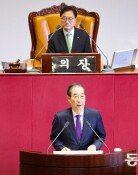Education chiefs should adjust free school meals before demanding childrearing budget
Education chiefs should adjust free school meals before demanding childrearing budget
Posted October. 09, 2014 01:42,
The national council of education superintendents announced, The council will not set aside in entirety the budget for childcare (2.14 trillion won or 1.995 billion U.S. dollars) at childcare centers for next year. The council declared complete suspension of financial subsidies for free childrearing, excluding the costs for education at kindergartens, out of the 3.93 trillion won needed for Nuri Program that is designed to support education and childrearing of children aged 3 to 5. The number of children subject to subsidies for childcare centers in next year amounts to 620,000 in total. Choi Kyung-hwan, deputy prime minister for economy and strategy and finance minister, said on Wednesday, Superintendents are threatening the government by taking people and children hostages.
Expansion of free welfare service policies deriving from populist programs by the political circle has spawned a flurry of disruptions in many corners of society. Education superintendents declaration came after the national council of city mayors and county and ward chiefs announced last month that they would declare welfare default when there`s no additional assistance from the central government. President Park Geun-hyes three major election pledges for education welfare - Nuri Program, free high school education, and Dolbom (care) Class- have not been reflected in next years education budget at all. Education superintendents claim that childcare centers responsible for "childrearing" do not fall under the realm of their responsibilities, saying such centers are overseen by the Health and Welfare Ministry.
Due to excessively generous pledges for welfare service that failed to take into consideration fiscal situations, local governments and education offices have begun a "game to hand over financial bomb" and to hold the other side responsible. This is a result of abuse of overly generous welfare policies. In the 2010 election for education superintendents, six superintendents with progressive ideology were elected by pledging across-the-board free school meals. Just ahead of the 2011 presidential election, the Democratic Party, the predecessor of the New Politics Alliance for Democracy, put forward three free policies" - free school meals, free childrearing and free medical service. In the 2012 presidential election, then candidates Park Geun-hye and Moon Jae-in pledged across-the-board free childrearing. However, expansion of welfare services without budgetary measures will inevitably result in mounting debts. The total value of debts owed by education offices nationwide stood at 14.04 trillion won (13.07 billion dollars) as of 2012. This accounts for 26.8 percent of the central governments total tax revenue.
It is urgently necessary for the government to adjust priorities amid limited budgetary resources. The free school meal program began in 2011 has become a black hole of education budget. As the country provides free school lunches to all children irrespective of their families income, budget allocated for children from underprivileged families and repair and maintenance of school facilities has significantly declined. If the government is anxious about fiscal burden stemming from an expansion in welfare spending, it should fundamentally reconsider universal free welfare service. In order to ensure equal opportunities among different economic classes, the country should not rob children from low-income families who truly need assistance of their portion, let alone increasing assistance to such low-income people, to provide free school meals to children from middle- and upper-class households.
James Heckman, professor of the University of Chicago and a Nobel laureate in economics, emphasizes that spending money in high school and college education is more helpful to social development rather than investing in rearing children aged 0 to 5 from low-income households. As the harsh reality of pledges for free welfare services, which are not sustainable, has been revealed now, it is time that Korea has to agonize over a fundamental solution to shortages of welfare budget.







